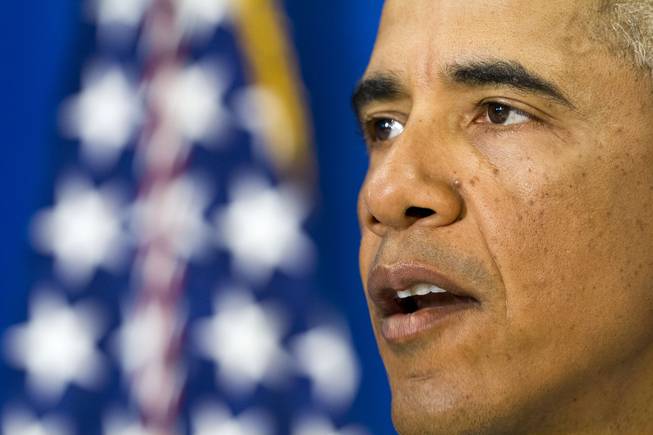
Jacquelyn Martin / AP
President Barack Obama speaks about the killing of journalist James Foley in Syria during a statement in Edgartown, Mass., Wednesday, Aug. 20, 2014.
Friday, Sept. 5, 2014 | 2 a.m.
President Barack Obama has been excoriated for declaring that “we don’t have a strategy yet” for effectively confronting the Islamic State group. In criticizing Obama for taking too much time, Rep. Mike Rogers, the Republican chairman of the House Intelligence Committee, told “Fox News Sunday” that “this ‘don’t-do-stupid-stuff’ policy isn’t working.” That sounded odd to my ear — like we should just bomb somebody, even if it is stupid. If Obama did that, what would he be ignoring?
First, experience. After 9/11, that sort of “fire, ready, aim” approach led George W. Bush to order a ground war in Iraq without sufficient troops to control the country, without a true grasp of Iraq’s Shiite-Sunni sectarian dynamics and without any realization that, in destroying the Sunni Taliban regime in Afghanistan and the Sunni Baathist regime in Iraq, we were destroying both of Iran’s mortal enemies and thereby opening the way for a vast expansion of Iran’s regional influence. We were in a hurry, myself included, to change things after 9/11, and when you’re in a hurry, you ignore complexities that come back to haunt you later.
There are no words to describe the vileness of the video beheadings of two U.S. journalists by the Islamic State, but I have no doubt that they’re meant to get us to overreact, à la 9/11, and rush off again without a strategy. The Islamic State is awful, but it is not a threat to America’s homeland.
Second, the context. To defeat the Islamic State, you have to address the context out of which it emerged. And that is the three civil wars raging in the Arab world today: the civil war within Sunni Islam between radical jihadists and moderate mainstream Sunni Muslims and regimes; the civil war across the region between Sunnis funded by Saudi Arabia and Shiites funded by Iran; and the civil war between Sunni jihadists and all other minorities in the region: Yazidis, Turkmen, Kurds, Christians, Jews and Alawites.
When you have a region beset by that many civil wars at once, it means there is no center, only sides. And when you intervene in the middle of a region with no center, you very quickly become a side.
The Islamic State emerged as an extreme expression of resentment by one side: Iraqi and Syrian Sunnis who felt cut out of power and resources by the pro-Iranian Shiite regime in Baghdad and the pro-Iranian Alawite/Shiite regime in Damascus. That is why Obama keeps insisting that the United States’ military intervention must be accompanied, for starters, by Iraqis producing a national unity government — of mainstream Shiites, Sunnis and Kurds — so our use of force supports pluralism and power-sharing, not just Shiite power.
But power-sharing doesn’t come easy in a region where kinship and sectarian loyalties overwhelm any sense of shared citizenship. Without it, though, the dominant philosophy is either: “I am strong, why should I compromise?” or “I am weak, how can I compromise?” So any onslaught we make on the Islamic State, absent national unity governments, will have Shiites saying the former and Sunnis saying the latter. That’s why this is complicated.
And this is a sectarian power struggle. Consider a New York Times article last week about how the Islamic State is actually being led by a combination of jihadists and disgruntled Sunni Iraqi Baathist army officers, who were shoved aside either by us or by Iraq’s Shiite-dominated governments.
The Times article noted: “After the Islamic State stormed into Mosul, one (Shiite Iraqi) official recalled a startling phone call from a (Sunni) former major general in one of Saddam’s elite forces. The former general had appealed months earlier to rejoin the Iraqi army, but the official had refused. Now the general was fighting for Islamic State and threatened revenge. ‘We will reach you soon, and I will chop you into pieces,’ he said, according to the official, Bikhtiyar al-Qadi, of the commission that bars some former members of Saddam’s Baath Party from government posts.”
Repeat after me: “We will reach you soon, and I will chop you into pieces.” That is what we are dealing with here — multiple, venomous civil wars that are the breeding ground of the Islamic State cancer.
Third, our allies are not fully allies: Although the Saudi, Qatari and Kuwaiti governments are pro-American, wealthy Sunni individuals, mosques and charities in these countries are huge sources of funds, and fighters, for the Islamic State.
As for Iran, if we defeat the Islamic State, it would be the third time since 2001 that we’ve defeated a key Sunni counterbalance to Iran — first the Taliban, then Saddam, now the Islamic State. That is not a reason not to do it, but it is reason to do it in a way that does not distract us from the fact that Iran’s nuclear program also needs to be defused, otherwise it could undermine the whole global nonproliferation regime. Tricky.
I’m all in on destroying the Islamic State. It is a sick, destabilizing movement. I support using U.S. air power and special forces to root it out, but only as part of a coalition, where everybody who has a stake in stability there pays their share and where mainstream Sunnis and Shiites take the lead by demonstrating they hate the Islamic State more than they hate each other.
Otherwise, we’ll end up in the middle of an awful mess of duplicitous allies and sectarian passions, and nothing good we do will last.
Thomas Friedman is a columnist for The New York Times.

Join the Discussion:
Check this out for a full explanation of our conversion to the LiveFyre commenting system and instructions on how to sign up for an account.
Full comments policy